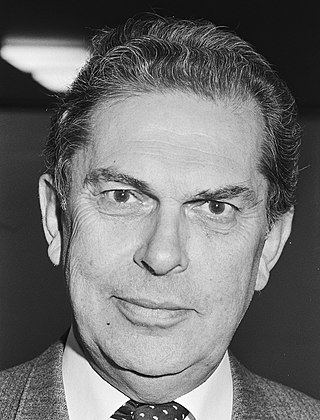
Barend Willem Biesheuvel was a Dutch politician of the defunct Anti-Revolutionary Party (ARP) now the Christian Democratic Appeal (CDA) party and jurist who served as Prime Minister of the Netherlands from 6 July 1971 until 11 May 1973.

The Cabinet of the United Kingdom is the senior decision-making body of His Majesty's Government. A committee of the Privy Council, it is chaired by the Prime Minister and its members include Secretaries of State and other senior ministers. Members of the Cabinet are appointed by the Prime Minister and are by convention chosen from members of the two houses of the Parliament of the United Kingdom, the House of Commons and the House of Lords.
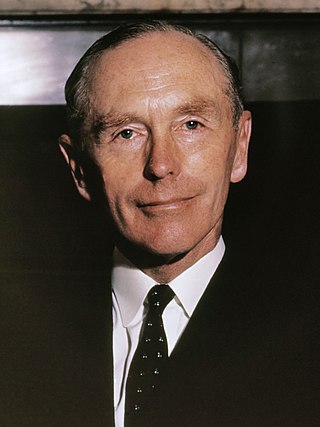
Alexander Frederick Douglas-Home, Baron Home of the Hirsel, styled as Lord Dunglass between 1918 and 1951 and the Earl of Home from 1951 until 1963, was a British Conservative politician who served as Prime Minister of the United Kingdom from 1963 to 1964. He is notable for being the last Prime Minister to hold office while being a member of the House of Lords, before renouncing his peerage and taking up a seat in the House of Commons for the remainder of his premiership. His reputation, however, rests more on his two stints as Foreign Secretary than on his brief premiership. During his first period as Foreign Secretary, from 1960 to 1963, he sat as a member of the House of Lords, and during his second tenure from 1970 to 1974 he sat as a member of the House of Commons.
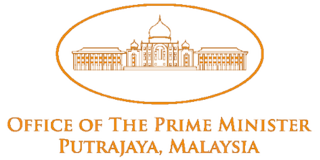
The Prime Minister of Malaysia is the head of government of Malaysia. The prime minister directs the executive branch of the federal government. The Yang di-Pertuan Agong appoints the prime minister as a member of Parliament (MP) who, in his opinion, is most likely to command the confidence of a majority of MPs. This person is usually the leader of the party winning the most seats in a general election.
The Catholic People's Party was a Catholic Christian democratic political party in the Netherlands. The party was founded in 1945 as a continuation of the Roman Catholic State Party, which was a continuation of the General League of Roman Catholic Caucuses. During its entire existence, the party was in government. In 1977, a federation of parties including the Catholic People's Party, the Anti-Revolutionary Party (ARP) and the Christian Historical Union (CHU) ran together under the Christian Democratic Appeal (CDA) banner. The three participating parties formally dissolved to form the CDA in 1980.

Jan Eduard de Quay was a Dutch politician of the defunct Catholic People's Party (KVP) now the Christian Democratic Appeal (CDA) party and psychologist who served as Prime Minister of the Netherlands from 19 May 1959 until 24 July 1963.

The 1963 Canadian federal election was held on April 8, 1963 to elect members of the House of Commons of Canada of the 26th Parliament of Canada. It resulted in the defeat of the minority Progressive Conservative (Tory) government of Prime Minister John Diefenbaker, with the Liberals returning to power for the first time in 6 years, where they would remain for twenty of the next twenty-one years. For the Social Credit Party, despite getting their highest ever share of the vote, the party lost 6 seats compared to its high-water mark in 1962.

Maurice Pascal Alers Hankey, 1st Baron Hankey, was a British civil servant who gained prominence as the first Cabinet Secretary and later made the rare transition from the civil service to ministerial office. He is best known as the highly-efficient top aide to Prime Minister David Lloyd George and the War Cabinet, which directed Britain during the First World War.

The prime minister of Kenya was a post in the Kenyan government. The first prime minister of Kenya was Jomo Kenyatta, who became prime minister in 1963. In 1964, Kenya became a republic, the post of prime minister was abolished and Jomo Kenyatta became president. Following a power-sharing agreement in February 2008, the role was recreated that April and held by Raila Odinga. The position was again abolished by the 2010 Constitution after the 2013 elections.

The Executive Committee or the Executive Committee for Northern Ireland was the government of Northern Ireland created under the Government of Ireland Act 1920. Generally known as either the Cabinet or the Government, the executive committee existed from 1922 to 1972. It exercised executive authority formally vested in the British monarch in relation to devolved matters.

The Ministry of General Affairs is the Dutch Ministry responsible for government policy, planning, information, and the Dutch royal house. The Ministry was created in 1937 and dissolved in 1945, but in 1947 it was reinstated by Prime Minister Louis Beel. The Ministry remained small until 1967, when it was greatly expanded by Prime Minister Piet de Jong. Since his premiership the Ministry has continued to expand to the present day. The Minister of General Affairs is the head of the Ministry who is also Prime Minister and a member of the Cabinet of the Netherlands. The current Minister and Prime Minister is Mark Rutte.

The De Quay cabinet was the executive branch of the Dutch Government from 19 May 1959 until 24 July 1963. The cabinet was formed by the christian-democratic Catholic People's Party (KVP), Anti-Revolutionary Party (ARP) and Christian Historical Union (CHU) and the conservative-liberal People's Party for Freedom and Democracy (VVD) after the election of 1959. The cabinet was a centre-right coalition and had a substantial majority in the House of Representatives with prominent Catholic politician Jan de Quay the former Queen's Commissioner of North Brabant serving as Prime Minister. Prominent Liberal politician Henk Korthals served as Deputy Prime Minister, Minister of Transport and Water Management and was given the portfolio of Suriname and Netherlands Antilles Affairs.

Nygaardsvold's Cabinet was appointed on 20 March 1935, the second Labour cabinet in Norway. It brought to an end the non-socialist minority governments that had dominated Norwegian politics since the introduction of the parliamentary system in 1884, and replaced it with stable Labour governments that, with the exception of during World War II, would last until the coalition Lyng cabinet in 1963.

The Lyng Cabinet governed Norway between 28 August 1963 and 25 September 1963. It was the first in 28 years not to be led by the Norwegian Labour Party. It was a centre-right coalition government of the Conservative Party, Centre Party, Christian Democratic Party and Liberal Party led by John Lyng of the Conservative Party. It had fifteen members, of which five were from the Conservative Party, four were from the Centre Party, three were from the Christian Democratic Party and three were from the Liberal Party. Karen Grønn-Hagen was the cabinet's only female member.
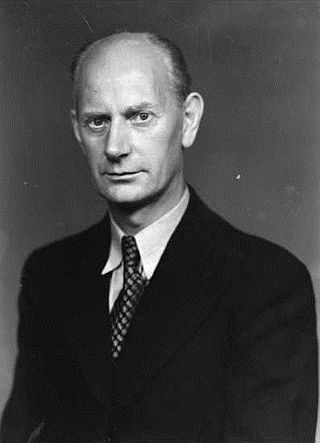
Gerhardsen's Third Cabinet was the cabinet of Norway from 22 January 1955 to 28 August 1963. The government was led by Prime Minister Einar Gerhardsen, marking his third term in said role. The cabinet was defeated in a motion of no-confidence in 1963 following the Kings Bay affair.
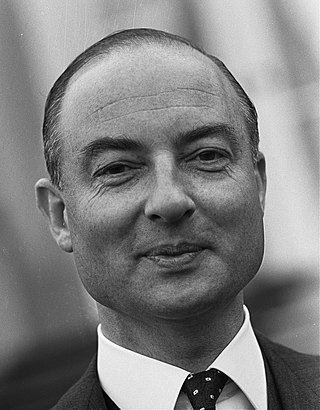
Wilhelm Klaus Norbert Schmelzer was a Dutch politician, diplomat and economist who served as Leader of the Catholic People's Party (KVP) from 1963 to 1971 and Minister of Foreign Affairs from 1971 to 1973.

Margaretha Albertina Maria "Marga" Klompé was a Dutch politician of the defunct Catholic People's Party (KVP) now merged into the Christian Democratic Appeal (CDA) party and chemist. She was granted the honorary title of Minister of State on 17 July 1971.

Croydon London Borough Council is the local authority for the London Borough of Croydon in Greater London, England. It is a London borough council, one of 32 in the United Kingdom capital of London. Croydon is divided into 28 wards, electing 70 councillors.
The Cabinet of Sarawak is the decision making organ of the executive branch of the Government of Sarawak, Malaysia. The cabinet consists of the Premier, appointed by the Governor on the basis that they are able to command a majority in the Sarawak State Legislative Assembly, as well as a number of ministers appointed from members of the legislature on the advice of the Premier.
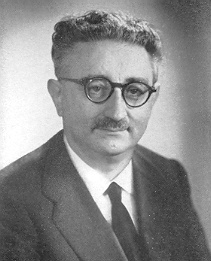
The Leone I Cabinet was the 18th cabinet of the Italian Republic, which held office from 22 June 1963 to 5 December 1963, for a total of 166 days, or 5 months and 13 days.


















